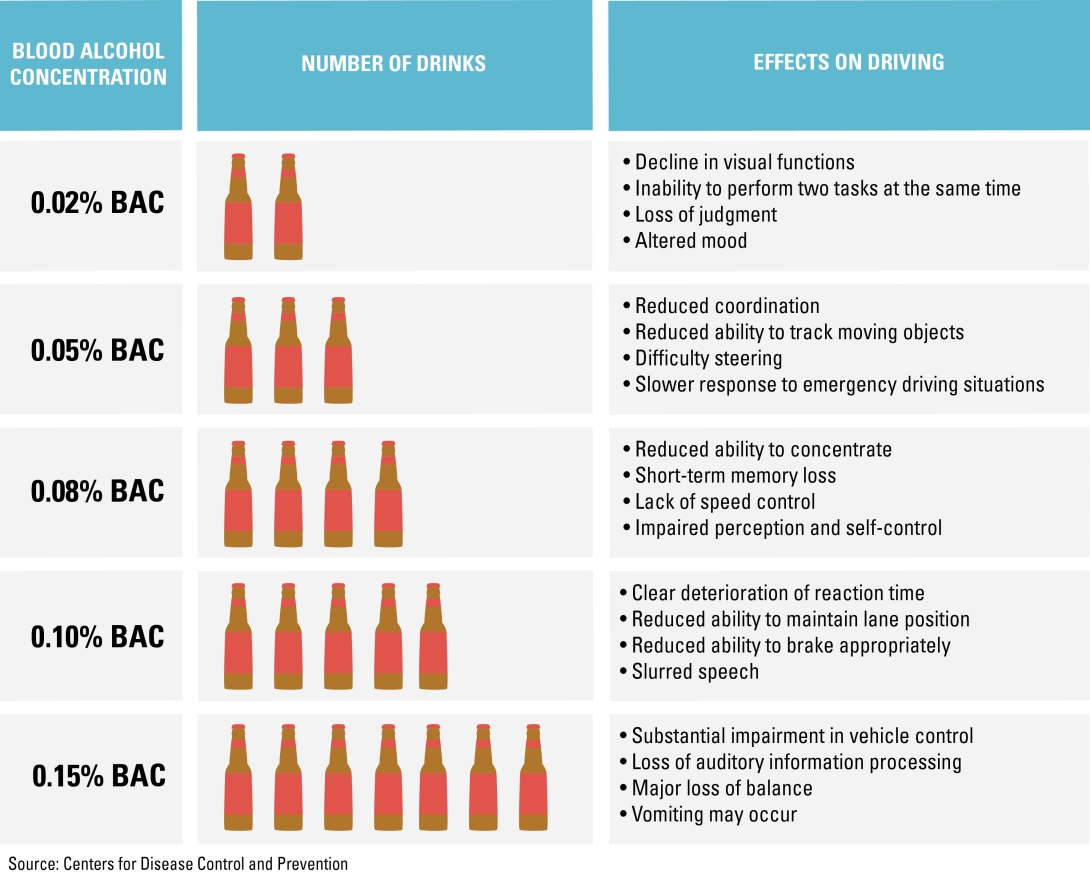Impaired Judgment: Alcohol Effects on Driving Safety

Several sources, including illnesses, alcohol, and medication, can contribute to impaired judgment. Impaired judgment is dangerous as it hampers the driver's ability to make accurate and correct decisions. It will cause the driver to take irrational actions and more risks than usual. The driver may not realize this, but they may get behind the wheel while impaired.
Studies have shown that increasing B.A.C. is also associated with a decreased reaction time. One study pointed to an average reduced reaction time of 120 milliseconds — just over a tenth of a second — related to a B.A.C. level of 0.08, the legal limit in Canada. So, when cruising at 70 miles per hour, a drunk driver would travel for an additional 12 feet before reacting to a roadway hazard.
According to the Centers for Disease Control and Prevention - a 160-pound man who consumes two alcoholic beverages will experience some loss of judgment, decreased ability to track a moving target rapidly, and reduced multitasking ability. After approximately four alcoholic drinks, one's balance, vision and reaction time are often affected. It becomes harder to detect roadway dangers.
Any amount of alcohol in your bloodstream can impact your driving ability. The effects of alcohol abuse vary greatly, putting you at risk of causing an accident or highway injury. Safe driving requires concentrating, making sound judgements, and quickly reacting to situations. However, alcohol affects these skills, putting yourself and others in danger.

https://healthblog.uofmhealth.org/wellness-prevention/how-alcohol-impairs-your-ability-to-drive
Impairment is any physical or mental condition that affects a driver's ability to operate a motor vehicle safely.
Several types of impairment can affect a driver, including:
Alcohol impairment
Alcohol is among the most common driving impairments. When a driver has a blood alcohol concentration (BAC) of 0.08% or higher, their ability to safely operate a motor vehicle is significantly impaired.
Drug impairment
Drugs, including prescription and over-the-counter medications, can impair a driver's ability to operate a motor vehicle safely. Some drugs cause drowsiness, dizziness, or other side effects that affect a driver's ability to react to traffic situations.
Fatigue impairment
Fatigue impairment can impair a driver's ability to focus on the road, react to traffic situations, and make good driving decisions. Fatigued drivers are likelier to fall asleep at the wheel or make mistakes that can lead to a crash.
Physical impairment
Physical impairment can include any condition that affects a driver's ability to control a vehicle, such as vision loss, hearing loss, or loss of limb function.
Emotional impairment
Emotional impairment can include stress, anxiety, and other mental health conditions affecting a driver's ability to operate a motor vehicle safely.
Being impaired while driving can have many consequences, including an increased risk of crashes, injuries, and fatalities. Impaired driving is illegal in Ontario and can result in serious legal matters, including fines, Licence suspension, and even imprisonment. Drivers need to take responsibility for their safety and the safety of others on the road by never driving while impaired.
If a driver is impaired, they should not get behind the wheel. Instead, they should find a safe alternative, such as a designated driver, public transportation, or a taxi service.
In addition, drivers should avoid taking medication that could impair their driving ability and get enough rest before driving to prevent fatigue impairment. By taking these steps, drivers can help to ensure their safety and that of others on the road.
